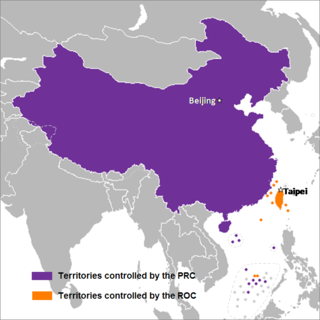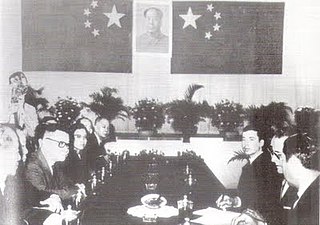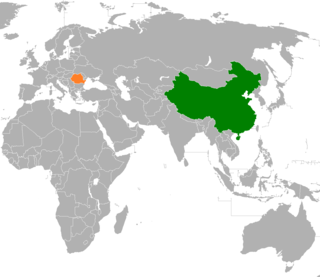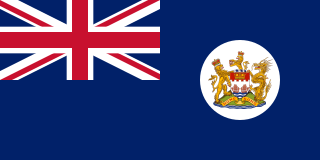Related Research Articles

Hong Kong is a special administrative region of the People's Republic of China. With 7.4 million residents of various nationalities in a 1,104-square-kilometre (426 sq mi) territory, Hong Kong is one of the most densely populated territories in the world.

The Chinese Civil War was fought between the Kuomintang-led government of the Republic of China and the forces of the Chinese Communist Party, with armed conflict continuing intermittently from 1 August 1927 until 7 December 1949, resulting in a Communist victory and control of mainland China in the Chinese Communist Revolution.

"Mainland China", also referred to as "the Chinese mainland", is a geopolitical term defined as the territory under direct administration of the People's Republic of China (PRC) in the aftermath of the Chinese Civil War. In addition to the geographical mainland, the geopolitical sense of the term includes islands such as Hainan, Chongming, and Zhoushan. By convention, territories outside of mainland China include:

Chinese unification, also known as Cross-Strait unification or Chinese reunification, is the potential unification of territories currently controlled, or claimed, by the People's Republic of China and the Republic of China ("Taiwan") under one political entity, possibly the formation of a political union between the two republics. Together with full Taiwan independence, unification is one of the main proposals to address questions on the political status of Taiwan, which is a central focus of Cross-Strait relations.

The Sino-Soviet split was the gradual deterioration of relations between the People's Republic of China (PRC) and the Union of Soviet Socialist Republics (USSR) during the Cold War. This was primarily caused by doctrinal divergences that arose from their different interpretations and practical applications of Marxism–Leninism, as influenced by their respective geopolitics during the Cold War of 1947–1991. In the late 1950s and early 1960s, Sino-Soviet debates about the interpretation of orthodox Marxism became specific disputes about the Soviet Union's policies of national de-Stalinization and international peaceful coexistence with the Western Bloc, which Chinese founding father Mao Zedong decried as revisionism. Against that ideological background, China took a belligerent stance towards the Western world, and publicly rejected the Soviet Union's policy of peaceful coexistence between the Western Bloc and Eastern Bloc. In addition, Beijing resented the Soviet Union's growing ties with India due to factors such as the Sino-Indian border dispute, and Moscow feared that Mao was too nonchalant about the horrors of nuclear warfare.

The First Taiwan Strait Crisis was a brief armed conflict between the People's Republic of China (PRC) and the Republic of China (ROC) in Taiwan. The conflict focused on several groups of islands in the Taiwan Strait that were held by the ROC but were located only a few miles from mainland China.

The 1967 Hong Kong riots were large-scale anti-government riots that occurred in Hong Kong during British colonial rule. Beginning as a minor labour dispute, the demonstrations eventually escalated into protests against the colonial government. The protests were partially inspired by successful anti-colonial demonstrations in Portuguese Macau which had occurred a few months prior.

The handover of Hong Kong from the United Kingdom to the People's Republic of China was at midnight on 1 July 1997. This event ended 156 years of British rule in the former colony, which began in 1841.

Cross-Strait relations are the relations between China and Taiwan.

Chinese-United Kingdom relations, more commonly known as British–Chinese relations, Anglo-Chinese relations and Sino-British relations, are the interstate relations between China and the United Kingdom.

Taiwanese nationality law details the conditions in which a person is a national of the Republic of China, commonly known as Taiwan. The Nationality Act is based on the principle of jus sanguinis, children born to at least one Taiwanese parent are automatically nationals at birth. Foreign nationals with permanent residency in Taiwan may naturalize after continuously living in the country for at least five (5) years. Certain foreign immediate family members of Taiwanese nationals may naturalize after continuously living in the country for at least three (3) years.
Tongzhi is a form of style used in China. It has taken on various meanings in various contexts during the 20th century. It was first introduced into vernacular Chinese by Sun Yat-sen as a way of describing his followers. Following the establishment of the People's Republic of China (PRC), tongzhi was used to mean "comrade" in a communist sense: it was used to address almost everyone, male and female, young and old. In recent years, however, this meaning of the term has fallen out of common usage, except within Chinese Communist Party (CCP) discourse and among people of older generations.

The 12-3 incident was a series of political demonstrations and riots against Portuguese colonial rule in Macau which occurred on December 3, 1966. The incident, inspired by the Cultural Revolution in the People's Republic of China, occurred as a direct response to a violent police crackdown by colonial authorities against local Chinese protesters demonstrating against corruption and colonialism in Macau.

The Kingdom of Romania and Republic of China (ROC) began relations on July 5, 1939.

Russia–Taiwan relations or Taiwan–Russia relations are the bilateral foreign relations between Taiwan and Russia. Due to the 2022 Russian invasion of Ukraine, relations became tense after Taiwan imposed sanctions against Russia. Russia placed Taiwan on a list of "unfriendly countries", along with South Korea, Japan, Singapore, the United States, European Union members, NATO members, Canada, Australia, New Zealand, Norway, Switzerland, Micronesia and Ukraine.

Hong Kong was a British colony and later a British Dependent Territory from 1841 to 1997, apart from a period of Japanese occupation from 1941 to 1945 during the Pacific War. The colonial period began with the British occupation of Hong Kong Island in 1841, during the First Opium War between the British and the Qing dynasty. The Qing had wanted to enforce its prohibition of opium importation within the dynasty that was being exported mostly from British India and was causing widespread addiction among the populace.

The Tibet Area is a province-level administrative division of China since 1950. It was created after the invasion of Tibet by the Republic of China (1912–1949), and nominally includes the Ü-Tsang and Ngari areas, but not the Amdo and Kham areas. The territories were merely claimed by the ROC, but actually controlled by an independent Tibet with a government headed by the Dalai Lama in Lhasa. The ROC was defeated during the Chinese Civil War; it retreated to Taiwan and lost control of mainland China to the People's Republic of China (PRC) in 1949; afterwards, the ROC continued to claim Tibet.
The Yale romanization of Mandarin is a system for transcribing the sounds of Standard Chinese, based on the Beijing dialect of Mandarin. It was devised in 1943 by the Yale sinologist George Kennedy for a course teaching Chinese to American soldiers, and was popularized by continued development of that course at Yale. The system approximated Chinese sounds using English spelling conventions, in order to accelerate acquisition of correct pronunciation by English speakers.

Willy Wo-Lap Lam is a Hong Kong columnist, newspaper editor, political commentator, political scientist, public policy analyst, sinologist, and writer. He is a frequent commentator on many major media networks regarding the current state of Chinese politics. He is currently a Jamestown Foundation fellow and an adjunct professor at the Centre for China Studies, Chinese University of Hong Kong.
Andreas Martin Fulda is a German political scientist, sinologist, sociologist, and an expert on China–EU relations. He is currently an associate professor of politics at the University of Nottingham and a senior fellow at the University of Nottingham Asia Research Institute and China Policy Institute of this university. Fulda is a foreign affair advisor of the Inter-Parliamentary Alliance on China (IPAC). He had lived and worked in Mainland China and Taiwan as a staff of the China Association for NGO Cooperation (CANGO) for eight years. Fulda frequently comments on current Chinese affairs in the media and he is a fierce critic of the Chinese Communist Party (CCP). Fulda argues that German universities do not need to rely on Confucius Institutes to organise events on China. His book The Struggle for Democracy in Mainland China, Taiwan and Hong Kong (2020) led to a smear campaign against him. Andreas Fulda sharply criticizes German chancellor Olaf Scholz's visit to China.
References
- Richard Baum, China Watcher: Confessions of a Peking Tom (Seattle: University of Washington Press, 2010).
- Harry Harding, "The Changing Roles of the Academic China Watcher" (Sigur Center for Asian Studies, 1999. Trends in China Watching: The PRC at Fifty)
- Gittings, John (1972). "China-watching in Hongkong". Journal of Contemporary Asia. 2 (4): 415–430. doi:10.1080/00472337285390371.